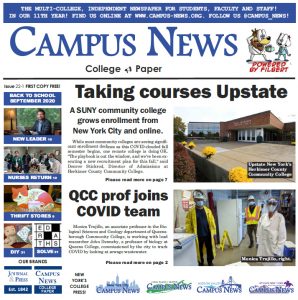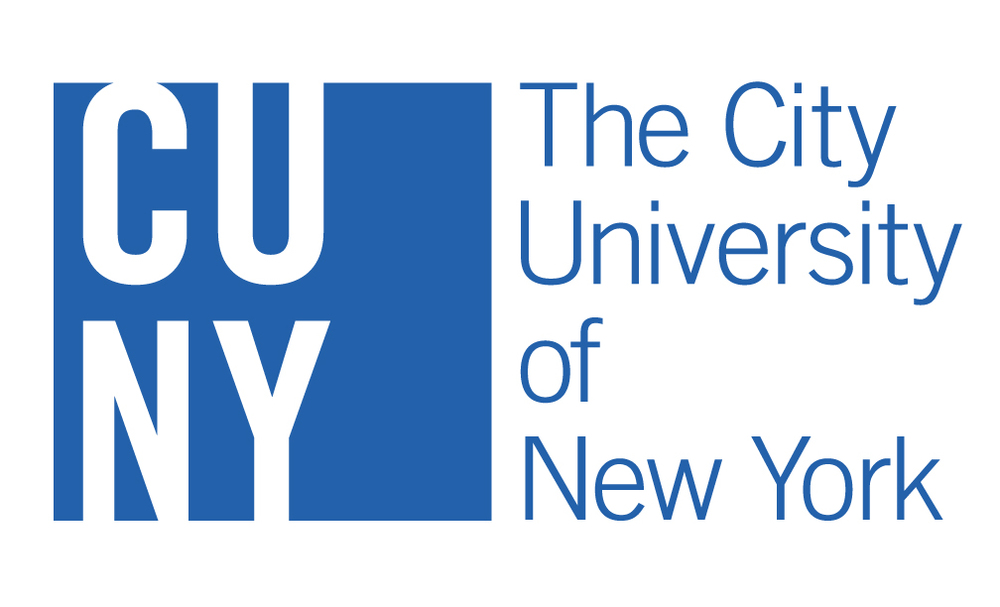The City University of New York and its 25 campuses have raised close to $17 million over the past six months in emergency relief funds that have helped thousands of students weather the economic impact of the COVID-19 pandemic.
The emergency funds, which are supported by donors ranging from philanthropic foundations to alumni and other individuals, are part of a broad effort by CUNY and its campuses to respond to the hardships faced by many of its students and their families.
In April, the University established the Chancellor’s Emergency Relief Fund, the first university-wide student assistance program of its kind at CUNY. That emergency fund has raised $8.3 million and thus far disbursed $500 grants to 6,000 students as well as retention and completion grants ranging from $200 to $1,000 to an additional 500 students to pay down tuition debts so they can re-enroll. At the same time, individual colleges and schools have raised more than $8.6 million on their own, enabling them to help nearly 10,000 students on their campuses who were adversely impacted by the pandemic.

“The pandemic has had a devastating economic impact on our students,” said Chancellor Félix V. Matos Rodríguez. “We applaud the tireless efforts of our campus communities to help their students, and we are extremely grateful to the many philanthropic and individual donors who stepped up and collectively donated millions to help thousands of our students in this especially difficult time. We will continue these efforts until the crisis has passed.”
CUNY has also distributed $118 million to students from the federal government’s Coronavirus Aid, Relief, and Economic Security (CARES) Act to help cover education-related expenses caused by the pandemic.
Some of the campus emergency funds were created in response to the pandemic while others are established student assistance programs that have mounted special fundraising campaigns to assist the large number of students in need during the crisis. They include a COVID emergency fund at Hunter College that has raised $1.3 million and provided emergency aid to more than 2,000 students, and a campaign by Lehman College that raised $1.1 million and helped 1,200 students.
Among CUNY’s professional schools, the Craig Newmark Graduate School of Journalism created a pandemic assistance fund that is providing $1 million in aid to students in need. CUNY’s community colleges have also drawn donors to student emergency funds, with Borough of Manhattan Community College leading the way with a virtual fundraiser that raised $430,000 and helped more than 1,000 students.
Many of the college emergency funds have received generous support from long-time CUNY benefactors such as the Carroll and Milton Petrie Foundation and Robin Hood. Campuses have also conducted online fundraising campaigns that have raised hundreds of thousands of dollars from their alumni, faculty and other individuals.
CUNY’s 25 campuses serve 275,000 degree-seeking students whose median household income is about $40,000 a year. Nearly half of all CUNY undergraduates work while in school, and many have found their jobs and incomes eliminated, drastically reduced or threatened — exacerbating financial pressures and challenges including food and housing insecurity.
Below is a look at the college emergency relief funds and links for donating.
BARUCH COLLEGE: The campus’s Student Emergency Fund, which typically raises money for a variety of needs ranging from food insecurity to student mental health, has raised $321,000 to provide students with emergency assistance during the pandemic. To date, about 300 students have received grants up to $750, allocated according to need. Click here to donate.
BOROUGH OF MANHATTAN COMMUNITY COLLEGE: A virtual fundraiser brought in about $480,000 for BMCC’s COVID-19 student emergency fund, which has thus far provided nearly 400 students with emergency grants averaging $450.
BRONX COMMUNITY COLLEGE: BCC’s emergency fund combines a recent $100,000 grant from Robin Hood and about $20,000 raised from individuals. The college hasn’t distributed student grants yet but has provided 1,200 students with loaned laptops purchased with $250,000 in state funds arranged by Assembly Members Victor Pichardo and Nathalia Fernandez.
BROOKLYN COLLEGE: The college has distributed about $300,000 to students from several emergency relief sources. They include the Brooklyn College Student Emergency Fund, which has raised money from individual donors and awarded 111 student grants averaging $1,135; and the Immigrant Student Success Office COVID-19 Emergency Relief Grant, funded by Robin Hood, which has provided 300 undocumented, DACA and other immigrant students with $500 emergency grants. Brooklyn is also in the third year of a $300,000 grant for emergency assistance from the Petrie Foundation and has distributed about $24,000 of those funds since March.
CITY COLLEGE: CCNY’s standing emergency funds program provides support for needs ranging from loss of a job to temporary homelessness. Its COVID-19 fundraising has brought in more than $400,000, providing emergency grants to 300 students thus far. Click here to donate.
COLLEGE OF STATEN ISLAND: CSI has raised $246,000, most from an annual donation from the Petrie Foundation. The total includes more than $33,000 raised through crowdfunding, which surpassed the college’s goal. To date, 242 students have received emergency grants. Click here to donate.
GUTTMAN COMMUNITY COLLEGE: Guttman has raised $53,000 from foundations and individuals for pandemic emergency relief and provided grants to 95 students. The college has also used its established student assistance funds to help students cover tuition balances and meet other financial challenges brought on by the pandemic.
HOSTOS COMMUNITY COLLEGE: Hostos has pooled about $325,000 from a variety of emergency funding sources, including Robin Hood, the Stavros Niarchos Foundation and an established Hostos Foundation program that helps students with emergency needs to pay tuition. Thus far, more than 400 students have received assistance.
HUNTER COLLEGE: The Hunter CARES (Coronavirus Assistance, Resources, and Education Support) fund supports students with needs including tuition assistance and help paying for books and technology for distance learning. The fund, an offshoot of Hunter’s ongoing emergency support services, has raised $1.3 million and provided emergency aid to more than 2,000 students, with grants typically ranging from $500 to $700. Click here for more information about Hunter’s emergency support resources.
JOHN JAY COLLEGE OF CRIMINAL JUSTICE: John Jay’s established Student Emergency Fund has raised $691,000 this year to help students with tuition, rent and utilities and food expenses during the pandemic. To date, 694 students have received grants.
KINGSBOROUGH COMMUNITY COLLEGE: The college has raised $110,000 for student emergency relief, primarily from the Petrie Foundation, and provided grants to 150 students.
LAGUARDIA COMMUNITY COLLEGE: The college’s established student emergency financial aid program has raised $300,000 to help students during the COVID-19 pandemic. To date, more than 300 students have received grants of approximately $300 each. Click here for more information and to apply for emergency aid.
LEHMAN COLLEGE: The Campaign for Lehman College has raised $1.1 million to support students experiencing food or housing insecurity and other financial difficulties during the pandemic. To date, the fund has provided emergency assistance to 1,200 students, including those served by Lehman’s food bank who have received gift cards for use at the college’s virtual pantry.
NEW YORK CITY COLLEGE OF TECHNOLOGY: The City Tech Foundation has raised about $60,000 from philanthropic and corporate donors and individuals. Thus far, about 650 students have received grants of varying amounts. Click here for more information.
QUEENS COLLEGE: In April, Queens College established a Critical Needs Fund to counter the impact of the pandemic, and with the broader mission of helping to “address the challenges Queens College will face now and in the future.” The Fund has raised $851,000. The funding allowed the college to help nearly 300 students since the spring semester with the cost of education, including books, tuition and housing. Grants ranged from nearly $300 to nearly $9,000 per student. Click here to donate.
QUEENSBOROUGH COMMUNITY COLLEGE: The QCC Coronavirus Community Fund has raised $192,000, including a $150,000 donation from Robin Hood, and has awarded $500 grants to 384 students. Click here for more information.
THE GRADUATE CENTER: To date, the Graduate Center has awarded 334 students grants averaging just under $1,000. The funds, totaling $325,000 to date, have been raised from faculty, staff, alumni, GC board members and a grant from the Carnegie Foundation. Click here for more information.
YORK COLLEGE: The college has raised more than $50,000 and provided emergency grants ranging between $600 and $1,000 to 68 students. Click here for more information.
CRAIG NEWMARK GRADUATE SCHOOL OF JOURNALISM: The CUNY journalism school raised $1 million to support both emergency financial aid for current students and expand scholarships for the incoming class of students during the pandemic. More than a third of this December’s graduating class of about 100 students received emergency grants totaling $283,000.
CUNY SCHOOL OF LAW has provided 35 students with emergency grants totaling $40,000.
SCHOOL OF PROFESSIONAL STUDIES: CUNY SPS has raised $394,000, including a $150,000 grant from the Petrie Foundation. To date, 157 students have received grants averaging about $1,425. Click here for more information.
SCHOOL OF PUBLIC HEALTH AND HEALTH POLICY: The CUNY SPH Student Emergency Fund, a year-round program, has raised $56,000 during the pandemic and awarded emergency grants averaging about $950 to 31 students. Click here for more information.






Facebook Comments